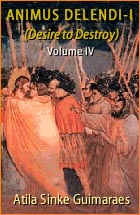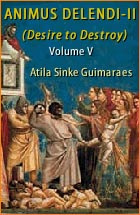Theology of History
 |
 |
 |
 |
 |
 |
 |
The ‘Orthodox’ Masquerade - VI
Rasputin Was Supported by
the Russian ‘Orthodox’ Church
We have seen the complicity of the Russian “Orthodox” Church with the forerunners of the Communist Revolution represented by the agitation of Fr. Gabon, who led an uprising against the Czar. Now let us analyze its complicity with Grigori Rasputin. He was the priest/occult magician who made himself indispensable to the Czarina Alexandra as he pretended to be able to stop the bleeding of her son, the Czarevich Alexei, who suffered from hemophilia.
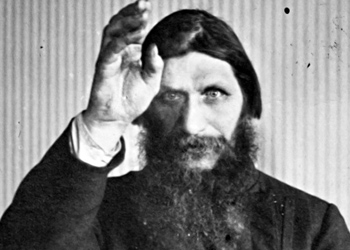 How did a peasant without any education or nobility find a trusted place in the palace of the Imperial Family and become not only a counselor of the Czar, but virtual governor of Russia? The Russian Schismatic Church played an important role in his career.
How did a peasant without any education or nobility find a trusted place in the palace of the Imperial Family and become not only a counselor of the Czar, but virtual governor of Russia? The Russian Schismatic Church played an important role in his career.
Prince Felix Yusupov, a highly placed Russian noble before the 1917 Revolution and an enemy of Rasputin took part in his assassination. He offers a firsthand picture of the monk where the complicity of that Church appears. In 1927 he wrote a book titled Memories of the Assassination of Rasputin, which is the primary source of the information in this article. (1)
Born in 1871 in Pokrovskoye, a village at the edge of western Siberia, Gregori Yefimovich was the son of a drunkard and horse dealer/thief named Yefim Novy. A horse thief like his father (a varnak, which is Siberia is one of the worst insults), he received at an early age the nickname of ‘Rasputinik’ – literally, the debauched or dissolute one.
A debauched mystic
The influence of a priest roused his mystical instinct. With a doubtful sincerity, his brutal and sensual temperament soon led him into the religious sect Khlystry, whose members were said to self-flagellate themselves and have orgies. This sect was a part of the Russian “Orthodox” Church. Its adepts pretended nothing less than to infuse into themselves the Word, Jesus Christ incarnate, and achieve a celestial communion through the most bestial passions.
In this monstrous confusion the remains of paganism and primitive superstitions survived. The nightly gatherings assembled the “faithful” in glades or cellars where hundreds of candles burned to provoke a religious ecstasy in the participants.
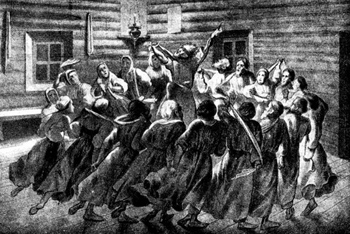 After the invocations, hymns and canticles, the sect members began a circle dance with a rhythmic fury that increased until it became a frenetic vortex. Since a state of vertigo was necessary for the “divine in-pouring,” one of the leaders would scourge those dancers who were relenting their pace.
After the invocations, hymns and canticles, the sect members began a circle dance with a rhythmic fury that increased until it became a frenetic vortex. Since a state of vertigo was necessary for the “divine in-pouring,” one of the leaders would scourge those dancers who were relenting their pace.
Finally, everyone would be rolling on the ground in ecstasy or convulsions, and the ceremony ended in a monstrous orgy. One “possessed by the spirit” no longer was master of himself: it was the “spirit” that acted in him and assumed the responsibility of the sins committed under its impulse.
Denounced by a priest, Rasputin was forced to leave the village at age 33. He went on foot wandering as a pilgrim. He also stayed for a time in the principal monastery of Siberia where, to acquire a reputation of sanctity, he took advantage of his past monstrous falls, for which he made terrible and spectacular penances. He imposed on himself fakir-like deprivations to develop his will and the magnetism of his gaze.
In the monasteries he studied the holy books. His prodigious memory allowed him to keep in his mind texts he could not understand, but that served in his relations with not only the ignorant, but also the learned, and later with the Czarina herself, who had graduated in philosophy at Oxford. (cf. pp. 128-130)
This was the man, vividly described by one of his contemporaries. Now, let me focus on the complicity of the Russian Schismatic Church with Rasputin.
Finding his way to court
He was welcomed at the St. Alexander Nevsky Theological Seminary in Petersburg by Fr. John Kronstadt, who saw a “spark of God” in this “young Siberian prophet.”
That first visit to the capital opened new perspectives to that astute peasant who lacked any scruples. Rasputin returned to his local village with broader ambitions and his pouch filled with coins. He began to acquire a name first among the low clergy, and gradually came to receive the consideration of archpriests and egumenos [abbots], who saw in him one “marked with God’s seal.”
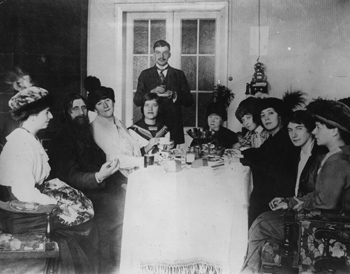 At the same time his reputation for holiness grew.
At the same time his reputation for holiness grew.
However, that devilish man never lost an opportunity to do bad things. In Zaryzin he raped a nun under the pretext of exorcizing her. In Kazan he was seen leaving a brothel, driving before him a naked young woman whom he lashed with belt blows. In Tobolsk he seduced the pious wife of an engineer, who became so enamored with him that she proclaimed her love everywhere, glorifying her shame.
But none of this mattered! Everything was permissible for a member of the Khlystry sect and intimacy with him should be considered nothing less than a grace from God.
His reputation of sanctity grew by the day. Crowds knelt as he passed, imploring: “Our Christ, our Savior, pray for us poor sinners! God will listen to you…” His response: “In the name of the Father, and of the Son and of the Hoy Spirit I bless you, my brethren. Have confidence! Christ will return soon. Be patient, remembering His agony! For love of Him, mortify your flesh!”
It did not take long for this “Siberian prophet” to find his way to a remarkable part of the Petersburg society, which became, through his influence, almost addicted to necromancy and occultism. He counted a whole suite of fanatical female admirers, among them the two Grand Duchesses of Montenegro, (2) who became ardent admirers of the “man of God.” In 1900 these two Duchesses had introduced the sorcerer Phillip into the Russian court; they were also those who presented Rasputin to the Empress in 1906.
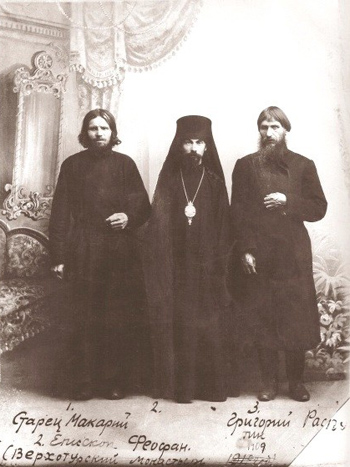 It was, however, the recommendation of archimandrite Theophane, the royal family's confessor, that dissipated any past doubts of the Czar and the Czarina:
It was, however, the recommendation of archimandrite Theophane, the royal family's confessor, that dissipated any past doubts of the Czar and the Czarina:
“Gregori Yefimovich is a simple man. Your Majesties cannot listen to him without receiving benefits, since it is the voice of the Russian people that speaks through his mouth. I know his sins: they are countless and abominable; but there is in him such a force of contrition and such a naïve faith in celestial mercy that I feel that I can guarantee his eternal salvation. He is, after each repentance, as pure as a child washed in the baptismal waters. God manifestly favors him with His predilection.” (apud pp. 130-131)
Quite cleverly Rasputin was careful not to hide his simple peasant background. He used to say about himself: “I am just a rude mujic who has entered the imperial palace and treads its grounds.” His influence over the Sovereigns was not due to his adulation of the Royal Family; quite the contrary, he spoke rudely to them with an audacious and sometimes trivial familiarity, assuming “the voice of the Russian people.” (cf. ibid.)
The scandalous behavior of this starez [walking monk], his occult influence over the supreme power, the obscenity of his customs finally did raise concerns in the more lucid milieus of the capital. Even the press, challenging the rigorous palace protective orders, denounced the ignominy of the “holy man.”
At a certain point, Rasputin found more prudent to remove himself from St. Petersburg, at least temporarily. In March 1911, he took the staff of pilgrim and left for Jerusalem, only to return to Zaryzin [Stalingrad], where he passed the summer at the house of one of his acolytes, the monk Eliodor. When he returned, in early winter, the orgies resumed wilder than ever.
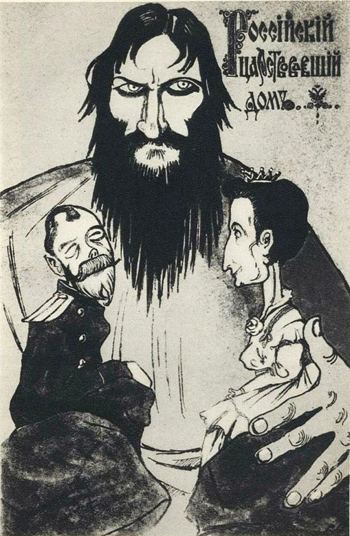 The pretended holiness of the starez only convinced those who saw him from a distance. The drivers who conveyed him to the saunas in the company of women, the waiters at restaurants who served during the nightly orgies, the secret police who were tasked with 24-hour surveillance over Rasputin, they all knew quite well what to think about that holiness. It is easy to imagine how all this was exploited by the party of the Revolution.
The pretended holiness of the starez only convinced those who saw him from a distance. The drivers who conveyed him to the saunas in the company of women, the waiters at restaurants who served during the nightly orgies, the secret police who were tasked with 24-hour surveillance over Rasputin, they all knew quite well what to think about that holiness. It is easy to imagine how all this was exploited by the party of the Revolution.
Many of those who were instrumental in bringing him in the society of Petersburg finally opened their eyes. Cursing his own error and unable to forgive himself for having introduced Rasputin to the court, archimandrite Theophane courageously raised his voice against him. The reward for the imprudent prelate was to be exiled to the Tauride. At the same time the episcopal see of Tobolsk was given to a venal, uneducated peasant, a childhood friend of Rasputin, with the aim of procuring the priesthood for Rasputin from the Holy Synod. (cf. pp. 134-135)
Due to the many scandals associated with his name, Rasputin was not made a priest. But he continued to spread an atmosphere of dissolute customs and primitive-bestial religiosity that greatly harmed the prestige of the court and prepared public opinion to reject the Monarchy and accept the Communist Revolution.
The Russian “Orthodox” Church was supportive of him either of its own initiative, as we have seen in this Prince Yusupov's account, or because it passively obeyed the orders of the Czar and Czarina, who blindly favored the corrupt monk to the end.
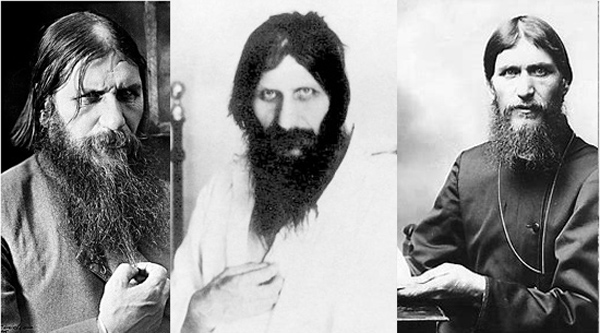


A magnetic, mesmerizing gaze that influenced many, both clerics and nobles
Prince Felix Yusupov, a highly placed Russian noble before the 1917 Revolution and an enemy of Rasputin took part in his assassination. He offers a firsthand picture of the monk where the complicity of that Church appears. In 1927 he wrote a book titled Memories of the Assassination of Rasputin, which is the primary source of the information in this article. (1)
Born in 1871 in Pokrovskoye, a village at the edge of western Siberia, Gregori Yefimovich was the son of a drunkard and horse dealer/thief named Yefim Novy. A horse thief like his father (a varnak, which is Siberia is one of the worst insults), he received at an early age the nickname of ‘Rasputinik’ – literally, the debauched or dissolute one.
A debauched mystic
The influence of a priest roused his mystical instinct. With a doubtful sincerity, his brutal and sensual temperament soon led him into the religious sect Khlystry, whose members were said to self-flagellate themselves and have orgies. This sect was a part of the Russian “Orthodox” Church. Its adepts pretended nothing less than to infuse into themselves the Word, Jesus Christ incarnate, and achieve a celestial communion through the most bestial passions.
In this monstrous confusion the remains of paganism and primitive superstitions survived. The nightly gatherings assembled the “faithful” in glades or cellars where hundreds of candles burned to provoke a religious ecstasy in the participants.

The circle dance of the orthodox sect that ended in orgies
Finally, everyone would be rolling on the ground in ecstasy or convulsions, and the ceremony ended in a monstrous orgy. One “possessed by the spirit” no longer was master of himself: it was the “spirit” that acted in him and assumed the responsibility of the sins committed under its impulse.
Denounced by a priest, Rasputin was forced to leave the village at age 33. He went on foot wandering as a pilgrim. He also stayed for a time in the principal monastery of Siberia where, to acquire a reputation of sanctity, he took advantage of his past monstrous falls, for which he made terrible and spectacular penances. He imposed on himself fakir-like deprivations to develop his will and the magnetism of his gaze.
In the monasteries he studied the holy books. His prodigious memory allowed him to keep in his mind texts he could not understand, but that served in his relations with not only the ignorant, but also the learned, and later with the Czarina herself, who had graduated in philosophy at Oxford. (cf. pp. 128-130)
This was the man, vividly described by one of his contemporaries. Now, let me focus on the complicity of the Russian Schismatic Church with Rasputin.
Finding his way to court
He was welcomed at the St. Alexander Nevsky Theological Seminary in Petersburg by Fr. John Kronstadt, who saw a “spark of God” in this “young Siberian prophet.”
That first visit to the capital opened new perspectives to that astute peasant who lacked any scruples. Rasputin returned to his local village with broader ambitions and his pouch filled with coins. He began to acquire a name first among the low clergy, and gradually came to receive the consideration of archpriests and egumenos [abbots], who saw in him one “marked with God’s seal.”

Rasputin with a group of his ‘little ladies’ who sought his favors of all sorts
However, that devilish man never lost an opportunity to do bad things. In Zaryzin he raped a nun under the pretext of exorcizing her. In Kazan he was seen leaving a brothel, driving before him a naked young woman whom he lashed with belt blows. In Tobolsk he seduced the pious wife of an engineer, who became so enamored with him that she proclaimed her love everywhere, glorifying her shame.
But none of this mattered! Everything was permissible for a member of the Khlystry sect and intimacy with him should be considered nothing less than a grace from God.
His reputation of sanctity grew by the day. Crowds knelt as he passed, imploring: “Our Christ, our Savior, pray for us poor sinners! God will listen to you…” His response: “In the name of the Father, and of the Son and of the Hoy Spirit I bless you, my brethren. Have confidence! Christ will return soon. Be patient, remembering His agony! For love of Him, mortify your flesh!”
It did not take long for this “Siberian prophet” to find his way to a remarkable part of the Petersburg society, which became, through his influence, almost addicted to necromancy and occultism. He counted a whole suite of fanatical female admirers, among them the two Grand Duchesses of Montenegro, (2) who became ardent admirers of the “man of God.” In 1900 these two Duchesses had introduced the sorcerer Phillip into the Russian court; they were also those who presented Rasputin to the Empress in 1906.

Fellow monk Makary, bishop Theophane of Poltava and Rasputin
“Gregori Yefimovich is a simple man. Your Majesties cannot listen to him without receiving benefits, since it is the voice of the Russian people that speaks through his mouth. I know his sins: they are countless and abominable; but there is in him such a force of contrition and such a naïve faith in celestial mercy that I feel that I can guarantee his eternal salvation. He is, after each repentance, as pure as a child washed in the baptismal waters. God manifestly favors him with His predilection.” (apud pp. 130-131)
Quite cleverly Rasputin was careful not to hide his simple peasant background. He used to say about himself: “I am just a rude mujic who has entered the imperial palace and treads its grounds.” His influence over the Sovereigns was not due to his adulation of the Royal Family; quite the contrary, he spoke rudely to them with an audacious and sometimes trivial familiarity, assuming “the voice of the Russian people.” (cf. ibid.)
The scandalous behavior of this starez [walking monk], his occult influence over the supreme power, the obscenity of his customs finally did raise concerns in the more lucid milieus of the capital. Even the press, challenging the rigorous palace protective orders, denounced the ignominy of the “holy man.”
At a certain point, Rasputin found more prudent to remove himself from St. Petersburg, at least temporarily. In March 1911, he took the staff of pilgrim and left for Jerusalem, only to return to Zaryzin [Stalingrad], where he passed the summer at the house of one of his acolytes, the monk Eliodor. When he returned, in early winter, the orgies resumed wilder than ever.

A Russian caricature of Rasputin's unnatural power over the Czar and Czarina
Many of those who were instrumental in bringing him in the society of Petersburg finally opened their eyes. Cursing his own error and unable to forgive himself for having introduced Rasputin to the court, archimandrite Theophane courageously raised his voice against him. The reward for the imprudent prelate was to be exiled to the Tauride. At the same time the episcopal see of Tobolsk was given to a venal, uneducated peasant, a childhood friend of Rasputin, with the aim of procuring the priesthood for Rasputin from the Holy Synod. (cf. pp. 134-135)
Due to the many scandals associated with his name, Rasputin was not made a priest. But he continued to spread an atmosphere of dissolute customs and primitive-bestial religiosity that greatly harmed the prestige of the court and prepared public opinion to reject the Monarchy and accept the Communist Revolution.
The Russian “Orthodox” Church was supportive of him either of its own initiative, as we have seen in this Prince Yusupov's account, or because it passively obeyed the orders of the Czar and Czarina, who blindly favored the corrupt monk to the end.

Rasputin worked his way into society and court with the help of the ‘orthodox’
- Principe Felix Yusupov, Dalla Corte all’Esilio. Memorie dell’Uccisore di Rasputin, Milan: Rizzoli, 1955
- They were the Grand Duchesses Miliza and Stana of Montenegro, sisters of the Queen of Italy. They were married to Tsar Nicholas's cousins: the first to Grand Duke Peter Nicolaievic, the second to the Duke of Liechtenberg.

Posted April 22, 2019
______________________
______________________






